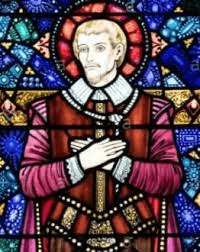John Rigby (martyr) facts for kids
Quick facts for kids SaintJohn Rigby |
|
|---|---|
 |
|
| Martyr | |
| Born | ca. 1570 Eccleston, Lancashire |
| Died | 21 June 1600 (aged 29 - 30) St. Thomas Waterings, England |
| Venerated in | Roman Catholic Church |
| Beatified | 15 December 1929, Rome by Pope Pius XI |
| Canonized | 25 October 1970, Rome by Pope Paul VI |
| Feast | 21 June, 25 October |
| Attributes | noose in neck, martyr's palm, shackles in ankles |
| Patronage | bachelors, torture victims |
John Rigby (born around 1570 – died June 21, 1600) was an English Roman Catholic man. He was put to death during the time of Queen Elizabeth I. He is known as one of the Forty Martyrs of England and Wales. These were people who died for their Catholic faith in England and Wales.
Contents
Life of John Rigby
John Rigby was born around 1570. His family lived at Harrock Hall in Wrightington, Lancashire. This area is close to Chorley, in Lancashire. He was one of many sons born to Nicholas Rigby and his wife, Mary.
In the year 1600, John Rigby worked for Sir Edmund Huddleston. John was a steward, meaning he helped manage Sir Edmund's household. Sir Edmund's daughter, Mrs. Fortescue, was called to court. She was accused of "recusancy," which meant she refused to attend the official Church of England services. Sir Edmund sent John to the court to explain that his daughter was too sick to come.
Questioned About His Faith
At the court, a judge asked John Rigby about his own religious beliefs. John bravely admitted that he was a Catholic. Because of this, he was sent to Newgate Prison. The very next day, he signed a statement. In it, he said that he had become a Roman Catholic again a few years earlier. This happened with the help of a Franciscan priest named Saint John Jones while John was in the Clink prison. He also stated that he had not attended Church of England services since then.
John was sent back to Newgate and later moved to another prison called the White Lion. He was given two chances to change his mind and give up his Catholic faith. Each time, he refused. He told the judge that he wanted the sentence for treason, which is a serious crime against the country.
His Execution
John Rigby's sentence was carried out on June 21, 1600. He was put to death at St. Thomas Waterings. As he was about to die, he gave the executioner a piece of gold. He said, "Take this as a sign that I freely forgive you and others who helped cause my death."
Canonization
John Rigby was made a saint in 1970. This means the Roman Catholic Church officially recognized him as a holy person. His special day, or feast day, is celebrated on October 25. The priest who helped John Rigby become a Catholic again, John Jones, had also died at the same place two years earlier.
Legacy
John Rigby is remembered in several ways today.
St John Rigby College
A school called St John Rigby Roman Catholic Sixth Form College is named after him. It is located in Orrell, near Wigan. One of the buildings at the college is called Harrock House. This name comes from Harrock Hall, which was John Rigby's birthplace.
Stained Glass Windows
You can also see stained glass windows that show John Rigby in some churches. One example is in Our Lady & All Saints Church in Parbold.
 | James Van Der Zee |
 | Alma Thomas |
 | Ellis Wilson |
 | Margaret Taylor-Burroughs |

